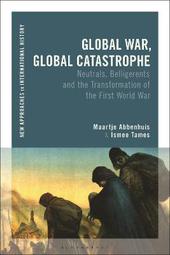
|
Global War, Global Catastrophe: Neutrals, Belligerents and the Transformations of the First World War
Paperback / softback
Main Details
| Title |
Global War, Global Catastrophe: Neutrals, Belligerents and the Transformations of the First World War
|
| Authors and Contributors |
By (author) Maartje Abbenhuis
|
|
By (author) Ismee Tames
|
| Series | New Approaches to International History |
|---|
| Physical Properties |
| Format:Paperback / softback | | Pages:248 | | Dimensions(mm): Height 234,Width 156 |
|
| Category/Genre | World history
First world war |
|---|
| ISBN/Barcode |
9781474275859
|
| Classifications | Dewey:940.3 |
|---|
| Audience | | Professional & Vocational | |
|---|
| Illustrations |
20 bw illus
|
|
Publishing Details |
| Publisher |
Bloomsbury Publishing PLC
|
| Imprint |
Bloomsbury Academic
|
| Publication Date |
7 October 2021 |
| Publication Country |
United Kingdom
|
Description
Winner of the World War One Historical Association's 2021 Norman B. Tomlinson, Jr. Prize Global War, Global Catastrophe presents a history of the First World War as an all-consuming industrial war that forcibly reshaped the international environment and, with it, impacted the futures of all the world's people. Narrated chronologically, and available open access, the authors identify key themes and moments that radicalized the war's conduct and globalized its impact, affecting neutral and belligerent societies alike. These include Germany's invasion of Belgium and Britain's declaration of war in 1914, the expansion of economic warfare in 1915, anti-imperial resistance, the Russian revolutions of 1917 and the United States' entry into the war. Each chapter explains how individuals, communities, nation-states and empires experienced, considered and behaved in relationship to the conflict as it evolved into a total global war. Above all, the book argues that only by integrating the history of neutral and subject communities can we fully understand what made the First World War such a globally transformative event. This book offers an accessible and readable overview of the major trajectories of the global history of the conflict. It offers an innovative history of the First World War and an important alternative to existing belligerent-centric studies. The ebook editions of this book are available open access under a CC BY-NC-ND 3.0 licence on bloomsburycollections.com.
Author Biography
Maartje Abbenhuis is Professor in Modern History at the University of Auckland, New Zealand. She is the author of several books on the international history of the nineteenth century and the First World War, including An Age of Neutrals (2014) and The First Age of Industrial Globalization (co-authored, 2019). Ismee Tames is Professor in History at Utrecht University and Senior Researcher at NIOD, Institute for War, Holocaust and Genocide Studies in Amsterdam, The Netherlands. Her most recent publication is Fighters across Frontiers: Transnational Resistance in Europe, 1936-48 (co-edited with Robert Gildea, 2020).
ReviewsIn blending economic, diplomatic, and social history, Maartje Abbenhuis and Ismee Tames convincingly demonstrate that the gradual shift from a European war to a global conflict dramatically affected neutral states and communities alike, and subsequently destabilized their economies and everyday activities ... Abbenhuis and Tames offer a stunning contribution to the global conflict and furthered Bloomsbury Academic's reputation as an authoritative publisher. * Journal of Military History * Wonderfully well written and organized, this book is an excellent synthesis of recent scholarship and a major contribution to the existing literature on an important but under researched topic. It also has much to tell us about neutral states in our own world of great power competition. * Michael S. Neiberg, author of Dance of the Furies: Europe and the Outbreak of World War I, USA * This book emerged from the desire of the authors to integrate neutral countries and neutrality into a general history of the First World War. It does this and much more. Above all, this book fully exposes the inescapability of the war's global influences and how 'the dynamics of destruction', to use the authors' words, affected every part of the world. This book is a revelation of the First World War's pervasive and destructive reach. * Glyn Harper, Professor of War Studies, Massey University, New Zealand * In this inspiring study, Maartje Abbenhuis and Ismee Tames have succeeded in presenting a truly global view of the First World War. Including states, peoples and individuals of both belligerent and neutral countries, they paint a comprehensive picture of this catastrophic period. * Prof. Dr. Wim Klinkert, Netherlands Defence Academy, University of Amsterdam, Netherlands * Abbenhuis and Tames have written a fine and rich global history of the Great War. They explore the devastating effects of the 1914-18 conflict on societies and families all over the world, and show how a new kind of war, industrialized and transgressive, created political expectations and hopes that could never be realized. * Jay Winter, Charles J. Stille Professor of History emeritus, Yale University, USA * This innovative book highlights the global scope of World War I and the transformations it introduced in societies all around the world, showing its multiple and totalizing echoes. It offers a fascinating and comprehensive perspective of the conflict that reassesses the connections, exchanges and interactions between neutrals and belligerents. * Maria Ines Tato, PhD in History, CONICET/Universidad de Buenos Aires, Argentina * The authors turn the conventional history of the Great War inside out. By focusing on colonies, neutral states, the naval war and the world economy, they provide a fresh and powerful analysis of how a world conflict indeed transformed the globe. A bravura performance. * John Horne, emeritus, Trinity College Dublin, Ireland * This book bracingly reappraises the First World War's global dynamics. Lucidly defining total war as a process, not a model, it shows how the conflict, from its inception, corroded notions of limited war. Importantly, Abbenhuis and Tames demonstrate how neutrality was part and parcel of the war's logic. * Sophie De Schaepdrijver, Walter L. and Helen P. Ferree Professor of Modern European History, The Pennsylvania State University, USA *
|